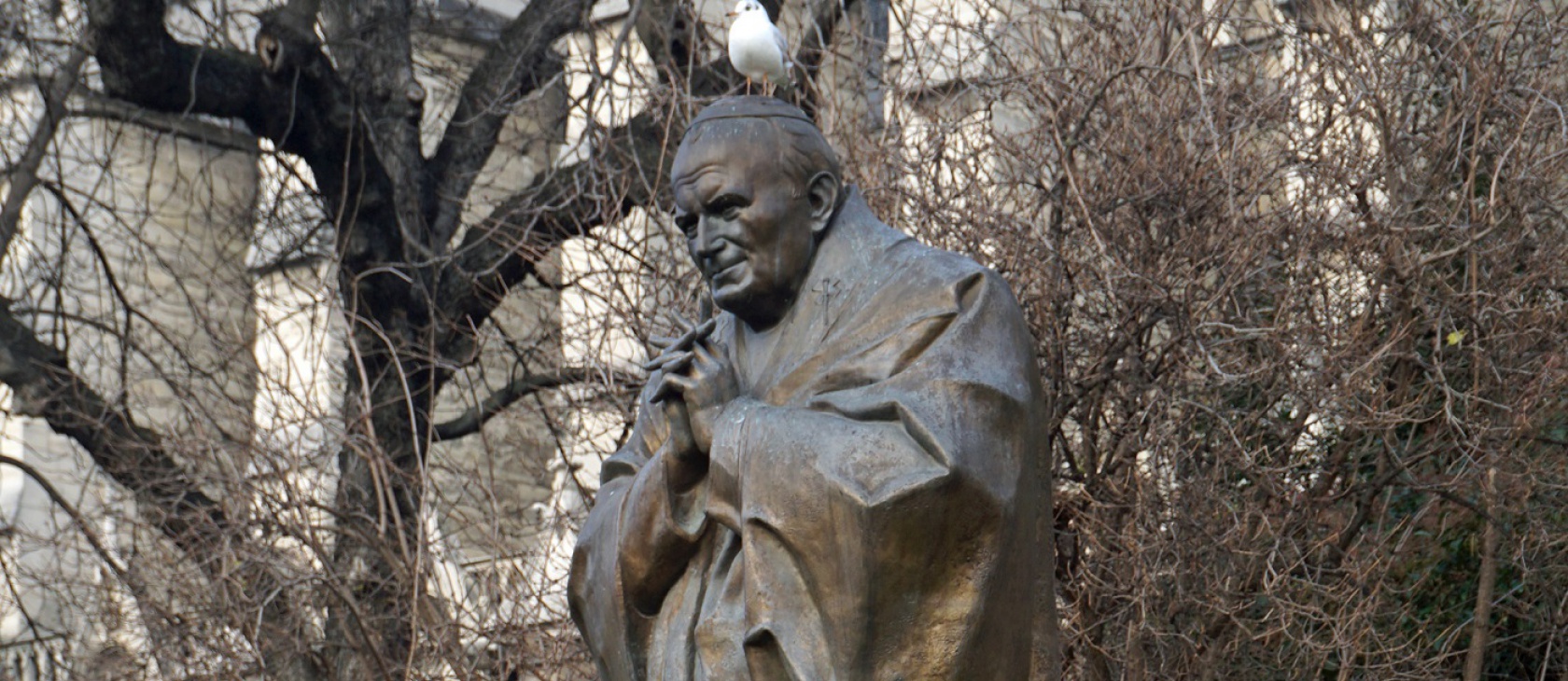Ploërmel – a small town of 9,000 inhabitants in Brittany, France – recently made the news over a controversy surrounding a monument honouring Pope John Paul II. A 7-meter-high statue of the pope was gifted to the town in 2006 by the Russian artist Zourab Tsereteli, who also sculpted the monumental statue of Peter the Great in Moscow. The trouble with the statue of the pontiff, which stood in a square named for him, is that it was topped by an arch with a large cross – and secularists said it violated the French doctrine of the separation of church and state.
Erected after a decision by the Ploërmel city council on October 28, 2006, the monument did not seem to disturb anybody – except for the “Morbihan Federation for Free Thought” and two inhabitants of Ploërmel. They petitioned the court for the monument to be removed from any public location, seeing it as a violation of the principle of secularism (laïcité), particularly of article 28 of the December 9, 1905, French Law on the Separation of the Churches and the State. This provision states that “in the future, it is forbidden to put up or affix any religious mark or emblem on public monuments or any public location, with the exception of buildings used for religious worship, burial grounds in cemeteries, funerary monuments, and museums or exhibitions.”
Thus, by a judgment of October 25, 2017, (“Morbihan Federation for Free Thought and Others,” no. 396990), the French Conseil d’Etat gave the town of Ploërmel six months to remove the cross atop the monument – but ruled the statue of Pope John Paul II and the arch could remain. Some pointed out the “outstanding exercise of legal contortion” performed by judges to reach such a decision. The court did not assess the work of art in its entirety but separated the statue itself from the overhanging cross – yet even the judgment mentions that “the monument would have included these two elements from its creation by the artist.” The judges accomplished this feat by ruling, on the one hand, that the installation of the statue resulted from a deliberation of the city council, and the council’s decision had been lawfully published. As the period for bringing a legal action had expired, it could not be challenged. On the other hand, the council’s deliberation mentioned the statue but no other element, like the arch or the cross. As such, the court ruled, “the installation of an arch and a cross above the statue should thus be considered as revealing a [distinct] decision by the mayor” which had never been published. This decision remains subject to challenge, as the period for bringing an action never began. So, the highest administrative jurisdiction in France explained in a release, “As the cross constitutes a religious mark or emblem within the meaning of article 28 of the 9 December 1905 law and, as its installation by the town does not fall in any of the exceptions foreseen by this article, its presence in a public location is inconsistent with this law.”
Reactions to the judgment of the Conseil d’Etat were immediate. About 300 people demonstrated around the monument to protest against this form of “Christianophobia.” Many posted pictures of the cross, or other crosses, on Twitter under the hashtag #ShowYourCross. The association “Don’t touch my Pope” proposed to buy the ground on which the monument was erected, making it private property. The mayor of Ploërmel considered bringing the case before the European Court of Human Rights (ECHR). The outcry was also heard beyond France’s borders. “The Polish government will try to save our compatriot’s monument from censorship, and we will propose to transfer it to Poland, if French authorities and the local community agree,” declared the Prime Minister Beata Szydło. He added that Pope John Paul II, “our great Pole, a great European, is a symbol of a Christian, united Europe.” József Michl, the mayor of the Hungarian town of Tata, also proposed to host the monument, affirming that “France has an evident problem with Europe’s Christian roots.”
Indeed, this case is symptomatic of the identity crisis suffered by France and Western Europe in general: They reject their Christian roots, culture, and identity. As Pope Benedict XVI said in 2010, “Christianity has enabled Europe to understand what the freedom, responsibility and ethics that imbue its laws and social structures actually are. To marginalize Christianity also by the exclusion of the symbols that express it would lead to cutting our continent off from the fundamental source that ceaselessly nourishes it and contributes to its true identity.”
The current redefinition of the terms “human rights” and “human dignity” seeks to “free” humanity from everything that gives it roots: culture, family, religion, etc.
The case of the monument in Ploërmel also illustrates the key issue of the French meaning of secularism, a principle having constitutional status since the 1946 Constitution and deemed the “cornerstone of the republican pact.” It also offers a glimpse into the nature of the separation of church and state arising out of the 1905 law, which was passed in a strongly anti-clerical context. While the distinction between religion and politics is good in itself and a fundamental aspect of the Christian civilization (“Render therefore unto Caesar the things which are Caesar’s, and unto God the things that are God’s” – St. Matthew 22:21), this Christian value seems to have gotten distorted beyond all recognition. In its French meaning, secularism seems to have become an instrument to fight against the presence and influence of religion or spirituality in social and national life. As such, secularism has taken on all the trappings of an antireligious civil religion which accurately replicates that which it purports to oppose. Such a conception thus fits into the current redefinition of the terms “human rights” and “human dignity,” which seeks to “free” humanity from everything that gives it roots: culture, family, religion, etc. It appears, in the words of professor Olivier Desaulnay, as a “means of imposing complete secularization of society and liberation of minds. Indeed, anti-religious secularism considers that the true freedom of conscience is acquired by freeing and emancipating from religion, by refusing it.”
Legally, the zeal of the Conseil d’Etat may seem surprising and contrasts a little with its decisions of November 9, 2016, (no. 395122 and 395223) in which it admitted that an artistic exception to secularism includes the affixing of religious marks or emblems. In those cases, associations of “free thinkers” were disturbed by the exhibition of Christmas nativity scenes in public buildings. The Conseil d’Etat ruled that such an exhibition by a public entity in a public location is legally possible, but only if it is of a cultural, artistic, or festive nature, without signifying any specific religious affiliation. In the present case, the monument is a work of art. As regards Pope John Paul II, although the sainted pope could hardly be more Catholic, he remains a person of great historical significance, not to mention a former head of state.
The present judgment can also be seen in connection with the famous case of Lautsi v. Italy (no 30814/06. March 18, 2011), in which the Grand Chamber of the ECHR ruled that the presence of the crucifix, “an essentially passive” religious symbol, in Italian public schoolrooms, does not violate human rights, including non-Christians’ right to freedom of religion. In substance, it ruled that in countries with a Christian tradition, Christianity possesses a specific social legitimacy distinguishing it from the other philosophical and religious beliefs and, consequently, justifying the prominent visibility of its symbols in society. The court also underlined that “secularity” is also a non-neutral ideological choice, as much as any other truly religious conviction.
While we wonder whether all the crosses which can be found through the countryside of the “douce France” will have to be removed one day, the statue of St. John Paul II – including its arch and cross – have been rescued. The diocese of Vannes bought the work of art, which was moved 30 meters to the private ground of a Catholic school adjacent to the St. John Paul II Square and from which the monument is still visible. On June 16, it was officially unveiled by the bishop of Vannes, in the presence of the ambassador of Poland, of numerous Polish people living in the region, and of the mayor of Ploërmel, who ultimately did not need to bring his case before the ECHR.
Calm has momentarily returned, and the West’s historical Christian roots have temporarily been acknowledged…until a future offensive from free thinkers who object to acts of blasphemy against their civil religion of secularism.
(Photo credit: Mariordo [Mario Roberto Duran Ortiz]. This photo has been cropped. CC BY-SA 4.0.)




